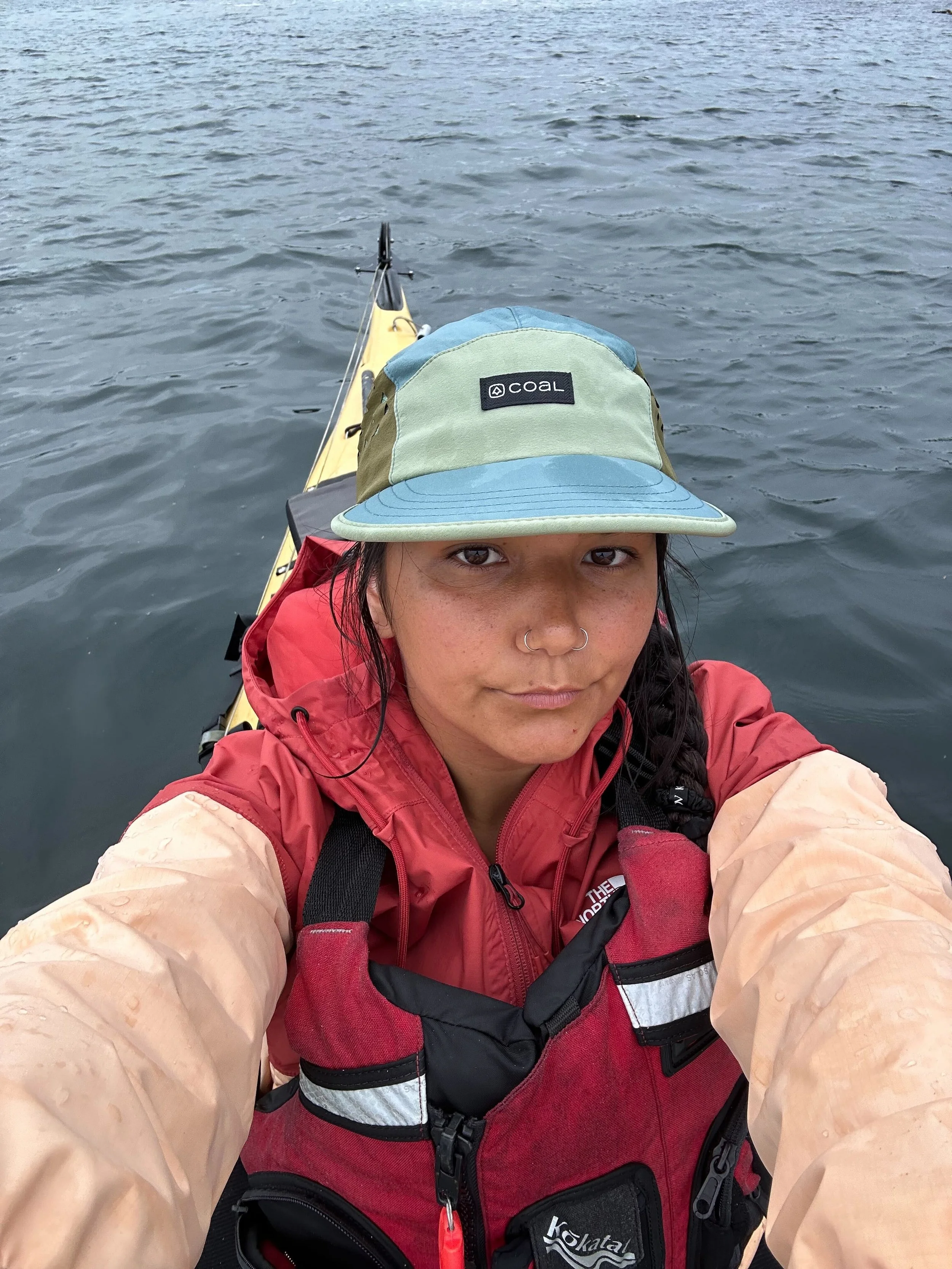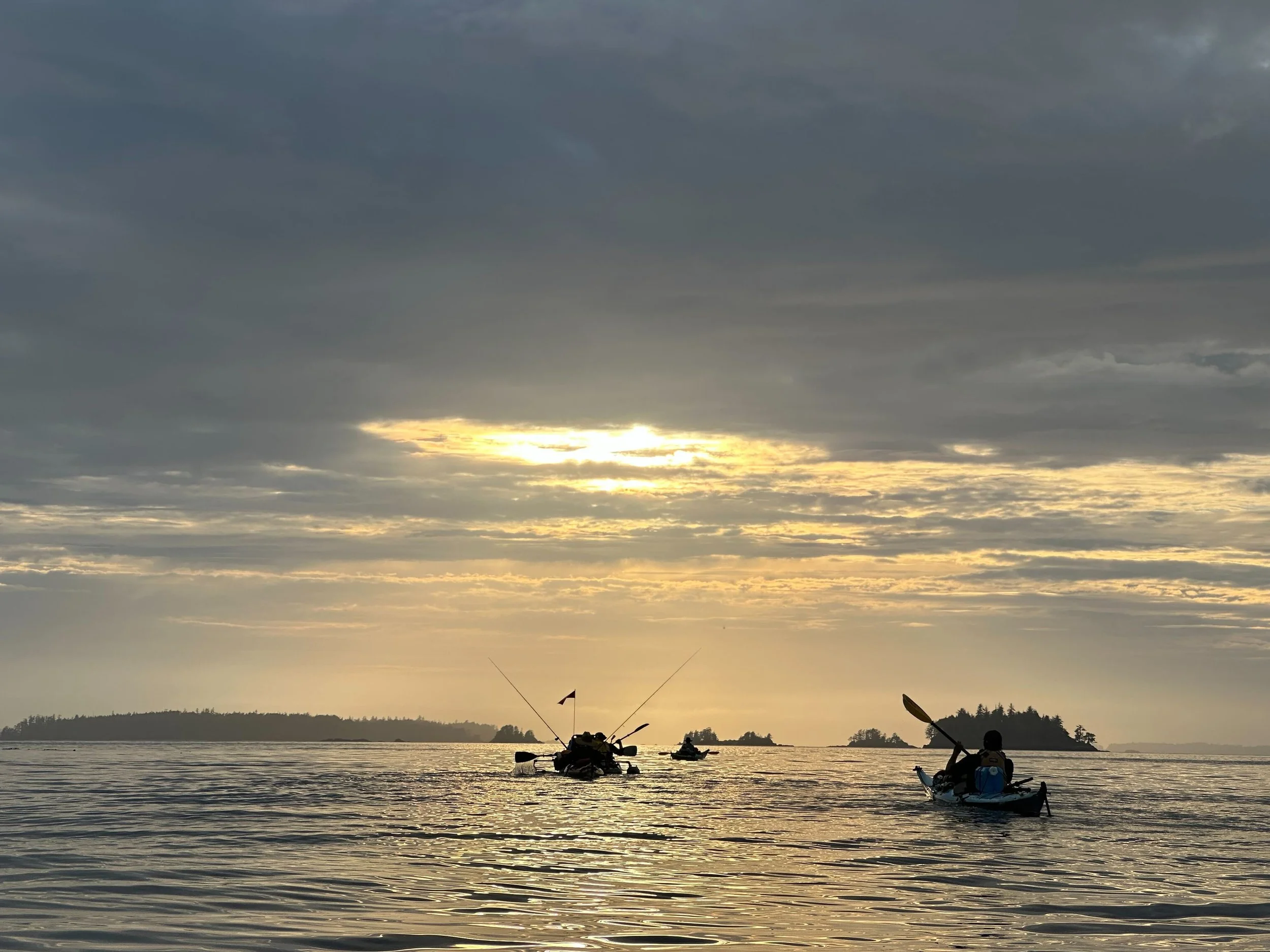From Land to Sea
If you frequent our newsletters or our blogs you will know who I am, but if you don’t;
ʔukłaas Shaelynn Trottier. ƛaʔuukʷiʔaqsups.
My name is Shaelynn Trottier, I am a ƛaʔuukʷiʔatḥ (Tla-o-qui-aht) woman.
Shaelynn Trottier on the Sea, Kayaking.
I work as a cultural ambassador and tour guide with Talaysay Tours, where I have spent almost three years learning from my Salish mentors about land, culture, language and community. Throughout these three years I have grown in many ways through these teachings, but also beyond. I have watched myself grow in terms of my confidence, gaining control of my social anxiety, and have witnessed an overall improvement in my mental health.
I started as a walking guide, following my mentors through parks and trails, in forests and on our coasts, watching, listening, and interacting with plants and the land. I gained confidence through their oral teachings, through reading books, listening to audio and recordings of elders. Soon leading my own tours, expanding my knowledge and building webs of understanding within my mind. I learned to introduce myself confidently, speaking up and sharing my family’s story. Sharing how it felt to grow up disconnected, confused, and often even angry without fully understanding why. It wasn’t until working here, studying here, and understanding the true history of colonization did I see why I was so angry. This work has been healing, elevating and a literal breath of fresh air.
Kayaks on Vargas Island, Ahousaht territory, at sunset.
As I progressed in my knowledge I gained the opportunity to become a mentor to others, to be a gentle educator and guide on the land.
In May of 2023 we had a team retreat up the Sechelt Inlet. As a team we met on the Sunshine Coast and prepared for a kayak paddle and camping experience. The origins of Talaysay Tours are of paddling and storytelling, the company being founded in Candace’s ancestral homeland of the Shíshálh people.
Arriving in Porpoise Bay Park we laid out our gear, laid out our kayaks, packed, and set off. This was my first ever paddling experience. I remember how it felt to be sitting on the water, to use my paddle to pull me through, and how it felt in my heart. It truly felt like connecting with my family, my ancestors, and our rich history on this beautiful coast. On the coast we are canoe people, we are water people. Here in the Coast Salish region, as well as where my family is from in the Nuu-chah-nulth region. These waters, the oceans, and the inlets are our traditional highways; an effective mode of transportation.
Group of paddlers on the waters in ƛaʔuukʷiʔatḥ and ahousaht territory.
To paddle is to live our culture. To be on our waters is to connect and to reconnect. When I went on the water that day I felt that connection. I have mentioned this before, and I will continue to say it, I am not doing this solely for me. This is for my witwiiʔuu, for my ʔaʔiičum ʔuḥʔiiš nananiqsu. For my nephews, for my elders, and my grandparents. For any children I may one day have.
Since that first paddle I’ve been fortunate enough to partake in multi-day kayak tours with Talaysay Tours. Most of my paddling has been up the Sechelt Inlet, and so far one special paddle in Clayoquot Sound, in my family's homelands and territory.
Where ƛaʔuukʷiʔatḥ (Tla-o-qui-aht) is in the Nuučaan̓uł (Nuu-chah-nulth) region is on the west side of the Vancouver Island Range, which is a sub-range of the Insular Mountains - the Insular Mountains cover Vancouver Island and Haida Gwaii. This mountain range helps insulate where I live now in Vancouver, making Vancouver and the East side of Vancouver Island more mild in weather. This mountain range helps break up any intense weather that may be coming off the Pacific Ocean.
ƛaʔuukʷiʔatḥ ḥaḥuułi is now known as Tofino, a popular small town for surfing and storm watching. Facing out towards the Pacific Ocean, without a mountain range to shield us. To navigate this our families would travel behind the Esowista peninsula, and stay in our winter village of huupic̓atḥ (Opitsaht.) That being said, Clayoquot Sound is an intense paddle. Awareness of the water, currents, and island breaks is important when navigating; especially with new or inexperienced paddlers.
This paddle reminded me of how strong our ancestors were; how strong our people are. This paddle made me think of my late Great Grandmother, Mary Hayes-mit. There have been times when I randomly google my family, most often Mary Hayes. She was a language keeper, a knowledge keeper, and one of our elders who had a hand in our language preservation - a reason I am able to learn our language today. In these times of random google searches I have come across a newspaper from 2007 with her in it. At this time she was about 90 years old, and sat down with a Ha-Shilth-Sa reporter, Denise Titian, to reflect on the changes in our people’s lifestyle and how it affects our health. She recalls as a young bride being able to paddle from Opitsaht to Clayoquot Island in only 25 minutes. I think of her strength and her resiliency, and I especially thought of that strength as I did that very same paddle in 2024.
Before setting off in our kayaks I met another ƛaʔuukʷiʔatḥ member on the beach, and he commented on how he felt seeing one of our people paddle in our waters again. He expressed he does not often see it, and he wants to see more of it. I think it is important for many reasons - it is important for our physical health, our cultural preservation and connection, and representation of our resiliency.
Coastal waters of Vargas Island, Ahousaht territory
I continue to paddle with Talaysay Tours, and continue to learn and grow. Through these experiences I am able to connect, but also help facilitate opportunities for others to connect as well. With gratitude I raise my hands to my mentors and the wonderful people I get to work with. Not only has this work provided a connection to water through kayaking, but as well as a connection to our Coast through other Coastal Nations. The generosity, the open arms and open minds is something that will sit with me throughout my life.
ƛ̓eekoo
(Thank you)




